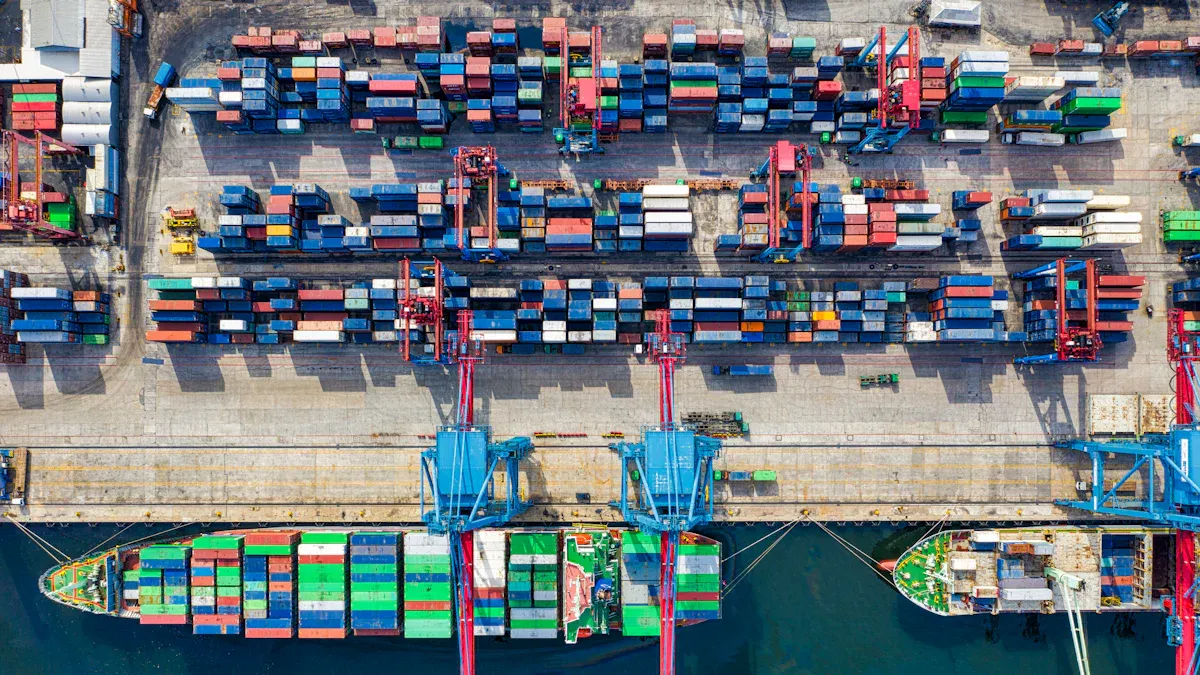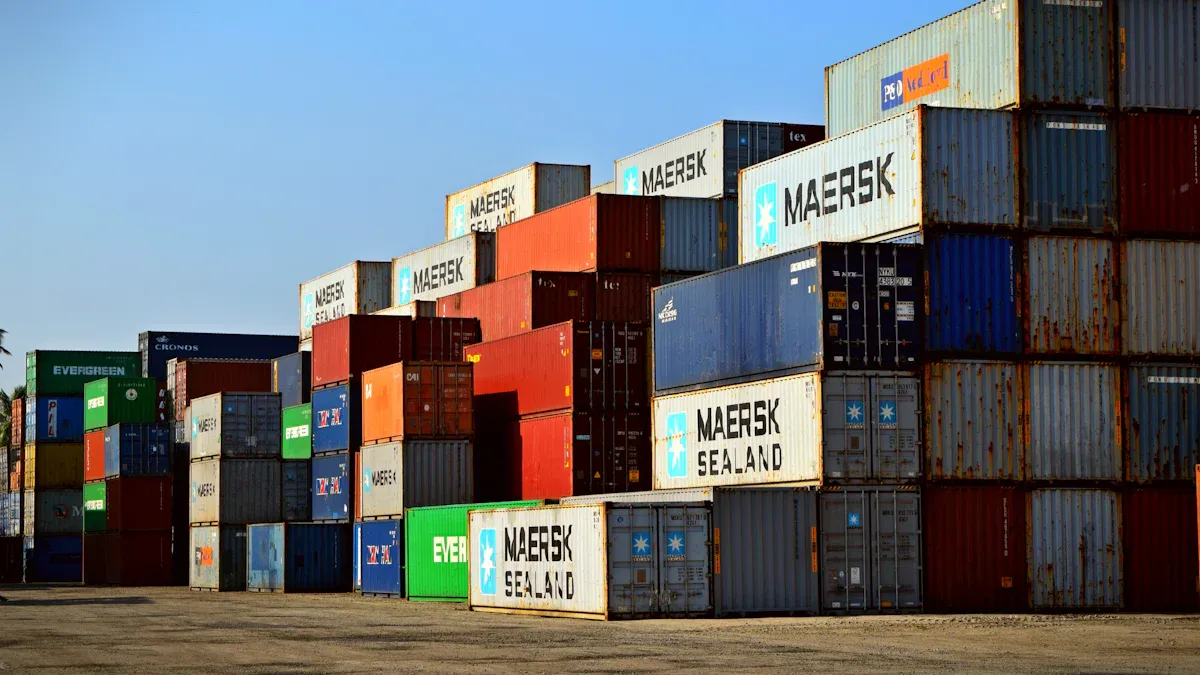What Shippers Really Want

When you choose a logistics partner, you want reliability above all else. In fact, 89% of shippers say reliability is their top priority. You also look for clear visibility, proactive updates, and trustworthy service that adds value. The Supply Chain Outsourcing study shows that 82% of shippers value better service more than lower costs. Today, technology and security matter more than ever.
Here are some recent statistics that highlight what matters most to shippers:
Valued Quality / Focus Area | Supporting Statistic / Insight |
|---|---|
AI adoption | AI can improve supply chain delivery effectiveness by 45%. |
Technology importance | 41% of logistics providers see technology as key for freight forwarding success. |
Cybersecurity awareness | 55.6% of businesses consider cybersecurity vital for supply chain resiliency. |
Warehouse automation | Over 80% of warehouses still lack automation, showing room for improvement. |
You want practical solutions that address your real concerns. That is what Shippers Really Want from their logistics partners.
Key Takeaways
Shippers want logistics partners who deliver shipments on time and keep their supply chains running smoothly.
Consistent service builds trust and helps shippers avoid surprises like delays, damaged goods, or billing errors.
Proactive communication with real-time updates lets shippers plan better and handle problems before they grow.
Technology like GPS tracking, IoT sensors, and system integration gives shippers clear visibility and control over shipments.
Shippers value partners who offer real service improvements and build trust beyond just offering low prices.
What Shippers Really Want
Reliability
When you look for a logistics partner, you want reliability above all else. Reliable service means your shipments arrive on time, every time. You depend on your logistics provider to keep your supply chain running smoothly. If your deliveries are late or inconsistent, your business can suffer. You may lose customers or face higher costs.
Reliability in logistics means more than just showing up. It means your provider delivers consistent, on-time, and dependable service. You want to know that your shipments will reach their destination as promised. This helps you plan better and avoid costly disruptions. Many shippers use tools like Transportation Management Systems (TMS) to track performance and make sure their partners meet high standards. These systems help you monitor on-time delivery, secure capacity, and avoid delays.
Did you know? Industry leaders like UPS report on-time delivery rates of over 96%. Most retailers expect at least a 95% on-time rate from their logistics partners.
You measure reliability using clear metrics. Here are some of the most important ones:
Reliability Metric | What It Means | Why It Matters for You |
|---|---|---|
On-Time Delivery (OTD) | Percentage of shipments delivered on schedule | Keeps your supply chain stable |
Rate of Damage and Loss | Percentage of goods damaged or lost | Protects your products and reputation |
Redelivery Rate | Percentage of shipments needing a second delivery attempt | Saves time and money |
Dwell Time | Time trucks spend waiting at facilities | Reduces delays and extra costs |
Freight Billing Accuracy | Percentage of invoices that are correct | Prevents billing headaches |
Transit Time | Time it takes for shipments to travel from origin to destination | Helps you plan and meet customer expectations |
Capacity Utilization | How much of the truck’s space is used | Improves efficiency and lowers expenses |
You want your logistics partner to hit these targets every time. When you get reliable service, you can focus on growing your business instead of worrying about late shipments or damaged goods. This is what shippers really want from their logistics providers.
Consistency
Consistency goes hand in hand with reliability. You expect your logistics partner to deliver the same high level of service every time. When you get consistent results, you build trust and confidence in your supply chain. You know what to expect, and you can promise your customers the same.
Consistent service means your shipments arrive on time, your products stay safe, and your invoices match your agreements. You do not want surprises or sudden changes. If your provider delivers well one week but fails the next, you cannot plan or keep your customers happy.
Consistent, on-time shipping helps you keep your customers loyal. Fast and reliable deliveries make your customers feel valued and encourage them to buy from you again.
Studies show that when you receive consistent logistics service, your satisfaction and loyalty increase. You are more likely to stick with a provider who delivers steady results. This is true even if another provider offers a lower price. In fact, many shippers say that reliability and consistency matter more than cost. You want a partner who keeps promises, communicates clearly, and solves problems quickly.
Here are some common pain points you face when consistency is missing:
Unreliable transit times that make planning hard
Damaged or lost freight that hurts your reputation
Invoice errors that waste your time
Poor communication that leaves you guessing
Carrier changes or service disruptions that cause delays
When your logistics partner delivers consistent, reliable service, you can avoid these problems. You gain peace of mind and can focus on what matters most—serving your customers and growing your business. This is what shippers really want in a logistics relationship.
Communication
Proactive Updates
You want to know where your shipments are at all times. Proactive communication gives you peace of mind and helps you plan ahead. Logistics partners use real-time tracking and reporting systems to keep you updated. These systems send automated notifications about delivery status, possible delays, or unexpected issues. You get regular updates, so you never have to guess what is happening with your freight.
"You need to implement a proactive way to communicate delays," says Zastarskis. For instance, GP Transco uses an API to integrate National Weather Service data into its transportation management system (TMS), enabling proactive communication to customers about expected delays.
When your logistics partner shares information early, you can make better decisions. For example, if a storm is coming, your provider may reroute or reschedule your shipment before problems occur. This level of transparency builds trust and helps you avoid costly disruptions. Shippers who receive frequent updates report higher satisfaction and fewer support calls. Companies that invest in proactive notifications see stronger loyalty and lower costs.
Real-time tracking and reporting systems give you visibility into shipments.
Automated notifications alert you to delivery status and potential issues.
Early warning systems detect delays and trigger outreach.
Problem Solving
Problems can happen in any supply chain. What matters is how your logistics partner responds. You expect quick action and clear solutions. The best providers use technology like IoT sensors and AI to monitor shipments and predict issues before they grow. They use data analytics to spot trends and improve inventory management.
Use of IoT sensors for real-time monitoring and data-driven decisions.
Application of AI for route optimization and predictive analytics.
Proactive management of your expectations through accurate delivery timeframes.
You also want your provider to collaborate with you. Open communication helps you solve challenges together. Centralized platforms or TMS tools make it easy to share updates and align strategies. When your logistics partner acts fast and keeps you informed, you feel confident and supported.
Visibility & Technology

Tracking
You want to see your shipments in real time. Modern tracking technology gives you this power. GPS tracking lets you know exactly where your goods are. You can watch your shipment move from the warehouse to your customer’s door. This helps you plan better and avoid surprises.
IoT devices add another layer of control. They monitor temperature and humidity, which is important for sensitive products like food or medicine. RFID tags make it easy to track items as they move through warehouses. These tools reduce mistakes and speed up inventory checks.
Real-time tracking helps you spot delays early. You can act fast to fix problems before they grow.
Many companies use cloud-based platforms to bring all this data together. You get a single view of your shipments, no matter where they are. Blockchain technology keeps your tracking data safe and easy to share with partners. FedEx uses GPS and route optimization to cut delivery delays by 30%. Pfizer uses IoT sensors to keep medicine safe, reducing spoilage by 20%. These tools give you more control and confidence in your supply chain.
Common tracking technologies and their benefits:
Technology | What It Does | Benefit for You |
|---|---|---|
GPS | Tracks shipment location | Reduces delays, improves planning |
RFID | Automates item tracking | Cuts errors, speeds up inventory checks |
IoT Sensors | Monitors shipment conditions | Protects sensitive goods |
Blockchain | Secures tracking data | Builds trust, prevents fraud |
Integration
You need your systems to work together. Integration connects your Transportation Management System (TMS), Warehouse Management System (WMS), and Order Management System (OMS). This gives you a clear view of your inventory, orders, and shipments.
When your systems talk to each other, you save time and money. TMS integration helps you track shipments, choose the best carrier, and automate payments. WMS integration boosts warehouse efficiency by up to 25%. OMS integration keeps your inventory accurate and speeds up order fulfillment.
Many shippers ask for API connections. APIs let your systems share data in real time. You can send load requests, get spot rates, and receive proof of delivery without manual work. Automated billing and document sharing make your supply chain run smoother.
Integration helps you avoid delays, reduce errors, and keep your customers happy.
You measure the value of these tools by looking at cost savings, faster shipping, and better order accuracy. Companies often use key performance indicators like shipping time and inventory accuracy to track improvements. When your technology works together, you gain control and flexibility across your supply chain.
Value & Trust

Beyond Price
You look for more than just low prices when you choose a logistics partner. Value and trust matter most. A recent study found that your loyalty depends more on how much value and trust you feel than on price alone. You want a partner who cares about your long-term success, not just quick savings.
Many top companies, like SKF and Apple, keep customers by focusing on value. They offer reliable service, smart technology, and strong relationships. DHL, for example, sometimes gives up short-term profits to help you optimize freight. This builds trust and leads to lasting partnerships.
You measure value in many ways:
Freight auditing services that reduce errors and save time.
Technology tools like TMS and real-time tracking that give you control.
Automation that makes your work easier and faster.
4PL partnerships that bring strategy, expertise, and better service.
Service improvements, not just cost savings.
"Building trust takes patience and a focus on long-term results, not just price."
You also look at how well your partner communicates and solves problems. Long relationships and proven results matter more than promises of quick savings. You want to see real examples of cost-saving projects and ongoing improvements.
Driver Quality
Drivers play a big role in your shipping experience. Their actions shape your trust in a logistics provider. You notice how drivers communicate, handle your goods, and solve problems. Good drivers keep you informed, deliver on time, and treat everyone with respect.
You use both numbers and personal feedback to judge driver quality:
Damage rates and cost per shipment
Customer satisfaction and clear communication
Flexibility and quick response to issues
You expect drivers to act professionally. They should give timely updates, handle paperwork correctly, and solve complaints calmly. These actions build trust and keep your supply chain running smoothly.
Drivers who show reliability, empathy, and strong communication help you feel confident in your logistics partner.
You often end partnerships when trust breaks down. Poor communication, missed goals, or a lack of focus on your needs can cause you to look for a new provider. You want a partner who values open dialogue, keeps promises, and works with you for mutual growth.
You want logistics partners who deliver on what Shippers Really Want: reliability, clear communication, strong visibility, and real value. Recent surveys show you value on-time delivery, proactive updates, and innovative technology.
You look for partners with proven success, flexible solutions, and transparent service.
You expect easy-to-use tools and a focus on efficiency.
To become your preferred partner, logistics providers should:
Simplify communication with centralized platforms.
Use technology to boost efficiency and visibility.
Reward high-performing carriers and ensure fair payments.
Offer flexible contracts and scalable services.
FAQ
What should you look for in a reliable logistics partner?
You should check on-time delivery rates, communication style, and technology use. Ask for references from other shippers. Look for partners who share updates and solve problems quickly.
How does technology improve your shipping experience?
Technology gives you real-time tracking and faster updates. You can see where your shipment is at any time. Automated systems help you avoid mistakes and save time.
Tip: Choose a partner who offers easy-to-use tracking tools.
Why does proactive communication matter for your business?
Proactive communication helps you plan better. You get alerts about delays or changes before they become problems. This keeps your customers happy and your supply chain running smoothly.
How can you measure value beyond price?
You can measure value by looking at service quality, delivery speed, and problem-solving skills. Check if your partner uses modern tools and keeps your goods safe. Value means more than just saving money.
See Also
Discover The Latest Trends In Sea Freight Logistics 2024
In-Depth Insights Into The Future Of LTL Freight
Exploring How AI Is Transforming Logistics Industry Today
